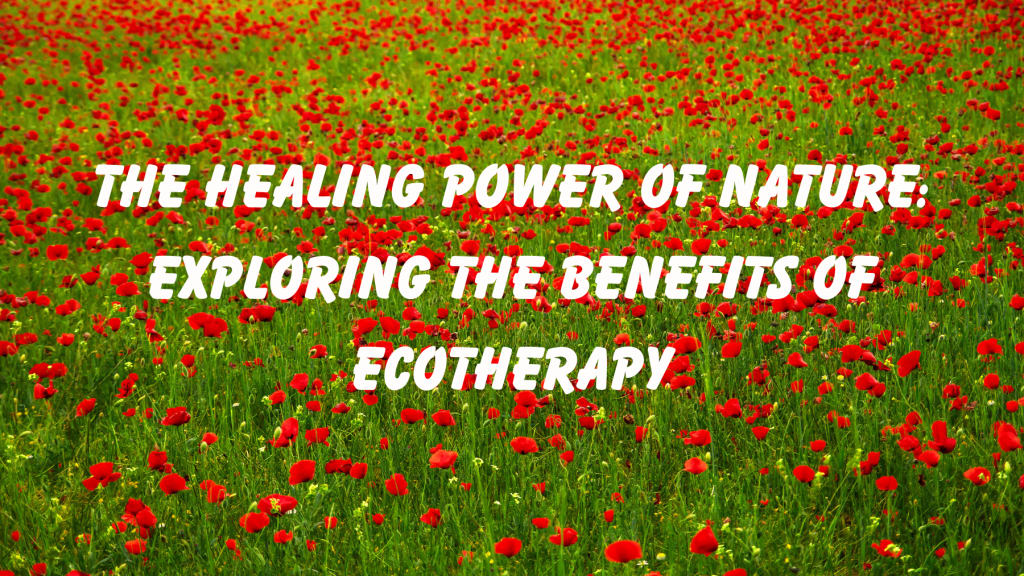The Healing Power of Nature: Exploring the Benefits of Ecotherapy
Harnessing the Restorative Effects of Nature for Physical and Mental Well-being

In our modern, fast-paced lives, we often find ourselves disconnected from the natural world. However, research suggests that reconnecting with nature can have profound benefits for our physical and mental well-being. This has given rise to a therapeutic practice known as ecotherapy, which involves engaging with nature to promote healing and restoration. In this article, we delve into the healing power of nature and explore the various benefits of ecotherapy.
Understanding Ecotherapy:
Ecotherapy, also known as nature therapy or green therapy, is an approach that recognizes the intrinsic connection between human well-being and the natural environment. It involves intentionally and mindfully engaging with nature to promote healing, stress reduction, and overall well-being. Ecotherapy encompasses a range of activities, including forest bathing, nature walks, gardening, outdoor meditation, and adventure therapy.
The Benefits of Ecotherapy:
Engaging in ecotherapy offers a multitude of benefits that contribute to our physical, mental, and emotional well-being. Here are some of the key advantages:
a) Stress Reduction: Spending time in nature has been shown to lower cortisol levels, a hormone associated with stress. Immersion in natural environments helps reduce anxiety, tension, and overall stress, promoting relaxation and calmness.
b) Improved Mental Health: Ecotherapy has been found to alleviate symptoms of depression and anxiety. Nature's calming effects, combined with the release of endorphins and increased serotonin levels, contribute to improved mood and overall mental well-being.
c) Enhanced Physical Health: Ecotherapy encourages physical activity and movement, whether it's walking in nature, gardening, or engaging in outdoor recreational activities. Regular physical activity in natural settings improves cardiovascular health, boosts immunity, and reduces the risk of chronic diseases.
d) Restored Attention and Focus: Nature provides a restorative environment that allows our overstimulated minds to relax and replenish. Spending time in natural settings helps improve attention, focus, and cognitive function, making us more productive and efficient.
e) Connection and Social Support: Ecotherapy often involves group activities, creating opportunities for social connection and support. Participating in nature-based programs or joining outdoor community initiatives fosters a sense of belonging and strengthens social bonds.
f) Increased Resilience and Coping Skills: Nature's resilience and adaptability inspire us to cultivate our own resilience. Facing challenges in natural environments can develop problem-solving skills, build self-confidence, and enhance our ability to cope with adversity.
Different Approaches to Ecotherapy:
Ecotherapy encompasses various practices that can be tailored to individual preferences and needs. Here are a few examples:
a) Forest Bathing: Forest bathing, or shinrin-yoku, originated in Japan and involves immersing oneself in a forest environment. It promotes mindfulness, sensory awareness, and connection with nature through slow walks, deep breathing, and observation of the natural surroundings.
b) Gardening Therapy: Gardening provides an opportunity to connect with the earth, nurture living plants, and witness the cycle of growth. Engaging in gardening activities promotes relaxation, creativity, and a sense of accomplishment.
c) Wilderness Therapy: Wilderness therapy involves immersive experiences in nature, often in a group setting, to facilitate personal growth and self-discovery. It combines outdoor adventure activities with therapeutic interventions, promoting self-reflection and emotional healing.
d) Nature Meditation: Practicing meditation in natural surroundings deepens the meditative experience. It allows for a profound connection with nature, fostering mindfulness, and inner calmness.
Incorporating Ecotherapy into Daily Life:
To harness the benefits of ecotherapy in your daily life, consider the following:
a) Spend Time in Nature: Incorporate regular nature walks or outdoor activities into your routine. Even short breaks spent in a nearby park or green space can have a positive impact on your well-being.
b) Create a Nature-Inspired Space: Bring elements of nature into your home or workspace. Incorporate plants, natural light, and nature-themed decor to create a soothing and calming environment.
c) Practice Mindful Observation: Take the time to observe and appreciate the natural world around you. Engage your senses by noticing the colors, sounds, textures, and scents of your surroundings. This mindful observation can enhance your connection with nature and deepen the therapeutic experience.
d) Connect with Community: Join local nature conservation groups, gardening clubs, or outdoor activity organizations. Engaging in nature-related activities with like-minded individuals provides a sense of community and support.
e) Practice Digital Detox: Reduce screen time and make an effort to disconnect from technology. Instead, spend that time outdoors, engaging with nature and embracing the present moment.
f) Incorporate Ecotherapy into Therapy Sessions: If you're seeking professional support, consider working with a therapist who incorporates ecotherapy principles into their practice. They can guide you in utilizing nature as a therapeutic tool for healing and growth.
The Role of Ecotherapy in Society:
In our increasingly urbanized and technologically driven world, ecotherapy plays a vital role in reconnecting individuals with nature. It highlights the importance of environmental stewardship, fosters a deeper appreciation for the natural world, and promotes sustainable living practices. Additionally, the therapeutic benefits of ecotherapy have implications for public health and well-being, leading to the development of nature-based interventions and programs in healthcare and community settings.
Conclusion:
Ecotherapy provides a powerful approach to healing and well-being by recognizing the inherent connection between humans and the natural world. Engaging in ecotherapy practices allows us to tap into the restorative power of nature, reducing stress, improving mental health, and fostering a sense of connection and resilience. By incorporating ecotherapy into our daily lives, we can prioritize our physical and mental well-being while cultivating a deep appreciation for the natural environment. So, step outside, immerse yourself in nature, and embrace the healing power that awaits you.





Comments
There are no comments for this story
Be the first to respond and start the conversation.